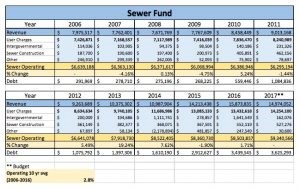This content was originally published by the Longmont Observer and is licensed under a Creative Commons license.
During the August 15, 2017, city council meeting, city council members voted to approve the city staffs' recommendation of increasing sewer rates by 3% in 2018, 2% in 2019, and 2% in 2020.
Mayor Coombs made the motion to vote on supporting the rate increases. Councilman Santos seconded.
“This is the cost of doing business. I hear it time and time again from the public 'run government like a business'. We are. When costs increase you, unfortunately, have to put those costs on the consumers. And unfortunately, that is what we have to do. Do I want another three, two, and two [referring to the rate increase percent]? No,” said Councilman Santos. “I don’t think anyone of us wants an increase in fees. I sure as hell don’t. But again, there are things we had to do as far as the wastewater treatment plant to bring it up to federal standards. We are doing that. Again, the cost of doing business.”
Several council members weighed in on the sewer rate increases before voting.
“I do think that although nobody wants to raise any more rates, it’s what we have to do in this case,” said Councilwoman Christensen. “We’ve been increasing rates for all kinds of things and people are very tired of hearing it and we are too. But we have to do this.”
“These incrementally small rate increases are easier to accept in my opinion. We could raise it 7% one year and then go for four years without any rate increase but I think that initial shock is a bigger impact on people than we give credit for, “ said Councilman Moore. “And even though people may not care what other people pay in other cities, we still do a really good job of managing our rates.”

Although the wastewater utility has reduced its staffing levels by 37% since 2000, annual operating costs have continued to increase by an average of 2.8% each year.
According to city council communication, the "major cost drivers affecting the utility include new regulatory requirements requiring large capital expenses at the wastewater treatment plant (WWTP), unrecovered flood related costs, deployment of new metering technologies, increasing post-recession construction costs, and aging wastewater infrastructure reaching the end of its life cycle."
An additional operating expense would be the purchase and implementation of a new billing system, which is currently 17 years old and is no longer supported by the vendor. The projected amount for this system is $1.2 million.
“I think I want to make clear is that the city of Longmont has a long history of investing and reinvesting in its public utilities to the point where our citizens can rely on those, day in and day out. Frankly, they know the sewers are going to work, they know the water is going to turn on, they know the lights are going to be on,” said Dale Rademacher, General Manager of Public Works and Natural Resources.
"I think that is part of why people enjoy being here in Longmont is, frankly, that reliability and the quality of those services that they get, which is in my head one of the core responsibilities of municipal government.”
To watch the presentation and vote in full, please see below:
https://youtu.be/ay4eZFAFpuw?t=2h11m24s


